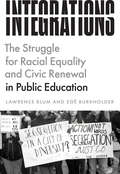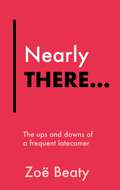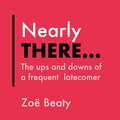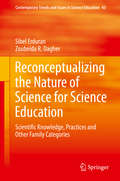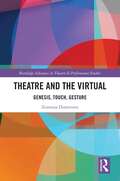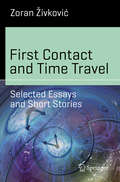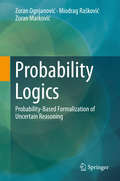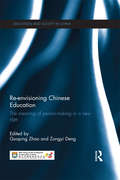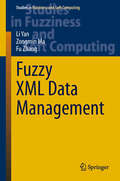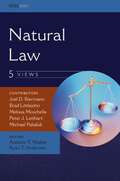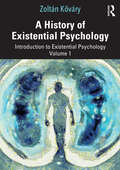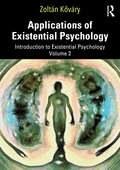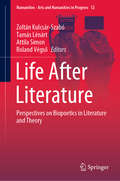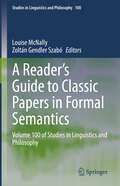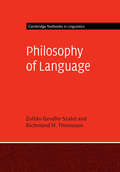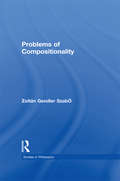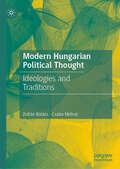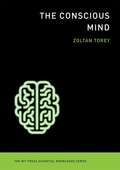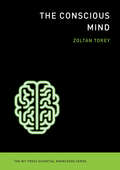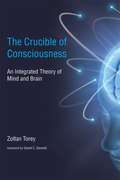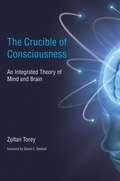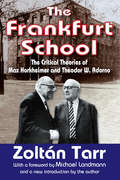- Table View
- List View
Integrations: The Struggle for Racial Equality and Civic Renewal in Public Education (History and Philosophy of Education Series)
by Lawrence Blum Zoë BurkholderThe promise of a free, high-quality public education is supposed to guarantee every child a shot at the American dream. But our widely segregated schools mean that many children of color do not have access to educational opportunities equal to those of their white peers. In Integrations, historian Zoë Burkholder and philosopher Lawrence Blum investigate what this country’s long history of school segregation means for achieving just and equitable educational opportunities in the United States. Integrations focuses on multiple marginalized groups in American schooling: African Americans, Native Americans, Latinxs, and Asian Americans. The authors show that in order to grapple with integration in a meaningful way, we must think of integration in the plural, both in its multiple histories and in the many possible definitions of and courses of action for integration. Ultimately, the authors show, integration cannot guarantee educational equality and justice, but it is an essential component of civic education that prepares students for life in our multiracial democracy.
Integrations: The Struggle for Racial Equality and Civic Renewal in Public Education (History and Philosophy of Education Series)
by Lawrence Blum Zoë BurkholderThe promise of a free, high-quality public education is supposed to guarantee every child a shot at the American dream. But our widely segregated schools mean that many children of color do not have access to educational opportunities equal to those of their white peers. In Integrations, historian Zoë Burkholder and philosopher Lawrence Blum investigate what this country’s long history of school segregation means for achieving just and equitable educational opportunities in the United States. Integrations focuses on multiple marginalized groups in American schooling: African Americans, Native Americans, Latinxs, and Asian Americans. The authors show that in order to grapple with integration in a meaningful way, we must think of integration in the plural, both in its multiple histories and in the many possible definitions of and courses of action for integration. Ultimately, the authors show, integration cannot guarantee educational equality and justice, but it is an essential component of civic education that prepares students for life in our multiracial democracy.
Integrations: The Struggle for Racial Equality and Civic Renewal in Public Education (History and Philosophy of Education Series)
by Lawrence Blum Zoë BurkholderThe promise of a free, high-quality public education is supposed to guarantee every child a shot at the American dream. But our widely segregated schools mean that many children of color do not have access to educational opportunities equal to those of their white peers. In Integrations, historian Zoë Burkholder and philosopher Lawrence Blum investigate what this country’s long history of school segregation means for achieving just and equitable educational opportunities in the United States. Integrations focuses on multiple marginalized groups in American schooling: African Americans, Native Americans, Latinxs, and Asian Americans. The authors show that in order to grapple with integration in a meaningful way, we must think of integration in the plural, both in its multiple histories and in the many possible definitions of and courses of action for integration. Ultimately, the authors show, integration cannot guarantee educational equality and justice, but it is an essential component of civic education that prepares students for life in our multiracial democracy.
Nearly There...: The ups and downs of a frequent latecomer
by Zoë BeatyWe all obsess about worrying less, but worrying can actually be good for you. Similarly we strive to be proactive and fast - but aren't there hidden benefits to procrastinating? The last thing a parent is meant to do is neglect their offspring, but children do amazing things when you just leave them alone. And at work we spend hours frantically brainstorming, but isn't there a benefit to just lazily staring out of the window? In this short piece, Zoe Beaty explores the benefits of being a frequent latecomer, and why not being on time might actually be the best thing for you.
Nearly There...: The ups and downs of a frequent latecomer (Everything Bad is Good for You #3)
by Zoë BeatyWe all obsess about worrying less, but worrying can actually be good for you. Similarly we strive to be proactive and fast - but aren't there hidden benefits to procrastinating? The last thing a parent is meant to do is neglect their offspring, but children do amazing things when you just leave them alone. And at work we spend hours frantically brainstorming, but isn't there a benefit to just lazily staring out of the window? In this short piece, Zoe Beaty explores the benefits of being a frequent latecomer, and why not being on time might actually be the best thing for you. EVERYTHING BAD IS GOOD FOR YOU is a new series of short pieces dedicated to the much-maligned personality traits that we should actually be promoting. Just as Susan Cain's QUIET showed that introversion is actually a superpower and Sarah Knight made us all realise that not giving a f**k can actually improve our lives, these surprising and entertaining audiobooks will celebrate our perceived flaws - and show why embracing rather than supressing them can be the difference between failure and success.
Nearly There...: The ups and downs of a frequent latecomer (Everything Bad is Good for You #3)
by Zoë BeatyWe all obsess about worrying less, but worrying can actually be good for you. Similarly we strive to be proactive and fast - but aren't there hidden benefits to procrastinating? The last thing a parent is meant to do is neglect their offspring, but children do amazing things when you just leave them alone. And at work we spend hours frantically brainstorming, but isn't there a benefit to just lazily staring out of the window? In this short piece, Zoe Beaty explores the benefits of being a frequent latecomer, and why not being on time might actually be the best thing for you. EVERYTHING BAD IS GOOD FOR YOU is a new series of short pieces dedicated to the much-maligned personality traits that we should actually be promoting. Just as Susan Cain's QUIET showed that introversion is actually a superpower and Sarah Knight made us all realise that not giving a f**k can actually improve our lives, these surprising and entertaining audiobooks will celebrate our perceived flaws - and show why embracing rather than supressing them can be the difference between failure and success.(P)2019 Hodder & Stoughton Limited
Reconceptualizing the Nature of Science for Science Education
by Sibel Erduran Zoubeida R. DagherPrompted by the ongoing debate among science educators over 'nature of science', and its importance in school and university curricula, this book is a clarion call for a broad re-conceptualizing of nature of science in science education. The authors draw on the 'family resemblance' approach popularized by Wittgenstein, defining science as a cognitive-epistemic and social-institutional system whose heterogeneous characteristics and influences should be more thoroughly reflected in science education. They seek wherever possible to clarify their developing thesis with visual tools that illustrate how their ideas can be practically applied in science education. The volume's holistic representation of science, which includes the aims and values, knowledge, practices, techniques, and methodological rules (as well as science's social and institutional contexts), mirrors its core aim to synthesize perspectives from the fields of philosophy of science and science education. The authors believe that this more integrated conception of nature of science in science education is both innovative and beneficial. They discuss in detail the implications for curriculum content, pedagogy, and learning outcomes, deploy numerous real-life examples, and detail the links between their ideas and curriculum policy more generally.
Theatre and the Virtual: Genesis, Touch, Gesture (Routledge Advances in Theatre & Performance Studies)
by Zornitsa DimitrovaTheatre and the Virtual lays out a set of conceptual instruments for the articulation and engendering of the forces of theatrical potentiality. Creating a passage toward a reconstitution of the given, a theatre of the virtual opens bodies in motion to a region of an ongoing genesis of forces. The outcome: regimes of constraint are abandoned through a radical practice of ecological attunement. Violence is eschewed through an onto-ecology of touch. Closed systems are repotentialised to become co-constitutive of their environments. A logic of spectrality settles in—not so much entities as atmospheres, not so much a being as a style of being, not so much a body as multitudinous milieus of response. This is the task of a theatre of the virtual—to safeguard the possibility of the extra-epistemological and uphold one’s right to offer accounts of oneself from outside of being, all the while creating a fractured record of the wondrous mutations of a moving, gesturing body. This book will be of great interest to students and scholars in theatre, philosophy, new materialisms, environmental humanities, gesture, and the ontology of response.
First Contact and Time Travel: Selected Essays and Short Stories (Science and Fiction)
by Zoran ŽivkovićThis volume collects both essays and fictional material around two core topics in the long career of the Serbian writer, essayist, researcher, publisher and translator. The first topic - first contact - is chiefly represented by his comprehensive essay on "The Theme of First Contact in the SF Works of Arthur C. Clarke" and reflected on the literary level with his short stories "The Bookshop" and "The Puzzle". Two shorter essays on the second topic - time travel in SF literature - introduce, amongst others, the well-known and fascinating mosaic novel Time Gifts, which skillfully explores the more literary side of the notions of past, present and future. In the annotations the author provides insights into his take on the subjects presented.
Probability Logics
by Zoran Ognjanović Miodrag Rašković Zoran MarkovićThe aim of this book is to provide an introduction to probability logic-based formalization of uncertain reasoning. The authors' primary interest is mathematical techniques for infinitary probability logics used to obtain results about proof-theoretical and model-theoretical issues such as axiomatizations, completeness, compactness, and decidability, including solutions of some problems from the literature. An extensive bibliography is provided to point to related work, and this book may serve as a basis for further research projects, as a reference for researchers using probability logic, and also as a textbook for graduate courses in logic.
Re-envisioning Chinese Education: The meaning of person-making in a new age (Education and Society in China)
by Zongyi Deng Guoping ZhaoMaintaining education as a pedagogical space for human formation, this book is distinctive in looking at the crisis rather than the success of Chinese education. The editors and contributors, mostly overseas and mainland Chinese scholars, argue that modern Chinese education has been built upon a superficial and instrumental embrace of Western modernity and a fragmented appropriation of Chinese cultural heritage. They call for a rethinking and re-envisioning of Chinese education, grounded in and enriched by various cultural traditions and cross-cultural dialogues. Drawing on Chinese history and culture, Western and Chinese philosophies, curriculum and pedagogical theories, the collected volume analyzes (1) why education as person-making has failed to take root in contemporary China, (2) how the purpose of education has changed during the process of China’s modernization, and (3) what a rediscovery of the meaning of person-making implies for rethinking and re-envisioning Chinese education in the current age of globalization and social change. Re-envisioning Chinese Education: The meaning of person-making in a new age discusses among other issues: China’s Historical Encounter with the West and Modern Chinese Education Rediscover Lasting Values: Confucian Cultural Learning Models in the Twenty-first Century Rethinking and Re-envisioning Chinese Didactics: Implications from the German Didaktik Tradition The New Basic Education and the Development of Human Subjectivity: A Chinese Experience This book will be relevant for scholars, researchers, and policy makers everywhere who seek a more balanced, more sophisticated, and philosophically better grounded understanding of Chinese education.
Fuzzy XML Data Management
by Li Yan Zongmin Ma Fu ZhangThis book presents an exhaustive and timely review of key research work on fuzzy XML data management, and provides readers with a comprehensive resource on the state-of-the art tools and theories in this fast growing area. Topics covered in the book include: representation of fuzzy XML, query of fuzzy XML, fuzzy database models, extraction of fuzzy XML from fuzzy database models, reengineering of fuzzy XML into fuzzy database models, and reasoning of fuzzy XML. The book is intended as a reference guide for researchers, practitioners and graduate students working and/or studying in the field of Web Intelligence, as well as for data and knowledge engineering professionals seeking new approaches to replace traditional methods, which may be unnecessarily complex or even unproductive.
Natural Law: Five Views (CriticalPoints Series)
by ZondervanThe story of "natural law" - the idea that God has written a law on the human heart so that ethical norms derive from human nature - in twentieth-century Protestant ethics is one of rejection and resurgence. For half a century, luminaries like Karl Barth, Carl F. H. Henry, and Cornelius Van Til cast a shadow over natural law moral reflection because of its putative link to natural theology, autonomous reason, associations with Catholic theology, and ethical witness devoid of special revelation. However, over the past twenty years, Protestant theologians have renewed their interest in the subject, often animated by debates on Christian involvement in the public arena and on matters of life, death, and gender and sexuality. Much of this engagement has happened within Reformed circles and has largely been conducted without reference to Roman Catholic construals of the natural law. Conversely, Catholic developments in natural law thinking have paid little attention to the surge of interest on the Protestant side. As a result, Protestant and Catholic natural proponents - and even those skeptical of the natural law - are not in conversation with one another.The lack of dialog between the various schools of natural law has left a historic tradition within Christian moral thought underdeveloped in contemporary Protestant theology. By bringing together a variety of perspectives in much-needed conversation, this book helps readers to understand the various construals of natural law within the broader strands of Christian and classical traditions and clarifies its unique importance for Christian moral witness in a secular culture. The contributors address the following questions:What is natural law?Can moral norms be derived from immanent, creaturely ends? If so, how specific or action-guiding can those norms be? How extensive might these moral norms be?How does natural law endure despite Christian insistence on the noetic, epistemological effects of sin?What is the relationship between Christian reflection on natural law and the broader classical tradition's understanding of natural law?How do Catholic and Protestant construals of natural law differ?What is the relationship between faith and reason?What's the relationship between human nature and natural law?Does "natural law" mean: "secular moral reasons"? Or is "natural law" merely religious belief disguised as public reason?How does natural law relate to public reason?Does the affirmation of a "natural law" lead to a natural theology? Or are these distinct?What is the relationship between natural law and the laws of nature?Five views:Classical Natural Law - Michael PakalukNew Natural Law - Melissa MoschellaReformed Natural Law - W. Bradford LittlejohnLutheran Natural Law - Joel D. BiermanAnti-Natural Law - Peter J. Leithart
A History of Existential Psychology: Introduction to Existential Psychology Volume 1
by Zoltán KőváryThe first in a two-part set, this book takes a deep dive into the history and theory of existential psychology.Beginning with a discussion of the “existentialism and psychology problem,” the book presents the philosophical and historical roots of existential psychology. It introduces the most important philosophical schools in the development of existentialism and their creators, such as Kierkegaard, Nietzsche, Heidegger and Sartre, as well as the literary roots of existentialism in the writings of Dostoevsky and Kafka and the important contribution of psychoanalysis and phenomenological psychiatry. The book then goes on to look at the existential psychology schools, including daseinsanalysis, logotherapy and existential analysis, the existential-humanistic school and the existential-phenomenological school.Going beyond the questions of therapy and counseling that typically make up the study of existential psychology, the book offers the ultimate introduction for students and scholars of this fascinating and deeply rooted discipline. It may also interest professionals working in related fields.
Applications of Existential Psychology: Introduction to Existential Psychology Volume 2
by Zoltán KőváryThe second in a two-part set, this volume offers a detailed examination of the application of existential psychology.This book begins by looking at the "conditio humana" – the most important topics of existential psychology, including anxiety, freedom, choices, authenticity, suffering and meaning, creativity, togetherness, time and death. It then moves through the practical application of existential psychology in the context of dreams, research, pathology and therapy. Examining key theories, models and research, the volume offers a fascinating overview of how the disciplines of art, philosophy, literature, science and theology contribute to a deeper understanding of personal self-knowledge and a person’s sense of purpose. This unique transdisciplinary approach demonstrates how readers can apply philosophical, historical and artistic aspects of existential psychology to their lives. The book concludes by considering the role of existential psychology in the present.Going beyond the questions of therapy and counselling that typically make up the study of existential psychology, the book offers the ultimate introduction for students and scholars of this fascinating and deeply rooted discipline. It may also interest professionals working in related fields.
Life After Literature: Perspectives on Biopoetics in Literature and Theory (Numanities - Arts and Humanities in Progress #12)
by Roland Végső Zoltán Kulcsár-Szabó Tamás Lénárt Attila SimonThis book offers innovative investigations of the concept of life in art and in theory. It features essays that explore biopoetics and look at how insights from the natural sciences shape research within the humanities. Since literature, works of art, and other cultural products decisively shape our ideas of what it means to be human, the contributors to this volume examine the question of what literature, literary and cultural criticism, and philosophy contribute to the distinctions (or non-distinctions) between human, animal, and vegetal existence. Coverage combines different methodological aspects and addresses a wide field of comparative literary studies. The essays consider the question of language (as a distinctive feature of human existence) in a number of different contexts, which range from Aristotle’s works, through several historical layers of the philosophical discourse on the origins of speech, to modern anthropology, and 20th century continental philosophy. In addition, the volume includes concrete case studies to the current post-humanism debate and provides literary, art historian, and philosophical perspectives on animal studies. The historical multiplicity of the various cultural representations of biological existence (be that human, animal, vegetal, or mixed) might serve as a productive foundation for discussing the nature and forms of literature’s critical contributions to our understanding of these fundamental categories. This volume opens up this subject to students and scholars of literature, art, philosophy, ethics, and cultural studies, and to anyone with a theoretical interest in the questions of life.
A Reader's Guide to Classic Papers in Formal Semantics: Volume 100 of Studies in Linguistics and Philosophy (Studies in Linguistics and Philosophy #100)
by Louise McNally Zoltán Gendler SzabóThis volume contains 21 new and original contributions to the study of formal semantics, written by distinguished experts in response to landmark papers in the field. The chapters make the target articles more accessible by providing background, modernizing the notation, providing critical commentary, explaining the afterlife of the proposals, and offering a useful bibliography for further study.The chapters were commissioned by the series editors to mark the 100th volume in the book series Studies in Linguistics and Philosophy. The target articles are amongst the most widely read and cited papers up to the end of the 20th century, and cover most of the important subfields of formal semantics. The authors are all prominent researchers in the field, making this volume a valuable addition to the literature for researchers, students, and teachers of formal semantics.Chapter 19 is available open access under a Creative Commons Attribution 4.0 International License via link.springer.com.
Philosophy of Language (Cambridge Textbooks in Linguistics)
by Zoltán Gendler Szabó Richmond H. ThomasonThis unique textbook introduces linguists to key issues in the philosophy of language. Accessible to students who have taken only a single course in linguistics, yet sophisticated enough to be used at the graduate level, the book provides an overview of the central issues in philosophy of language, a key topic in educating the next generation of researchers in semantics and pragmatics. Thoroughly grounded in contemporary linguistic theory, the book focus on the core foundational and philosophical issues in semantics and pragmatics, richly illustrated with historical case studies to show how linguistic questions are related to philosophical problems in areas such as metaphysics, epistemology, and ethics. Students are introduced in Part I to the issues at the core of semantics, including compositionality, reference and intentionality. Part II looks at pragmatics: context, conversational update, implicature and speech acts; whilst Part III discusses foundational questions about meaning. The book will encourage future collaboration and development between philosophy of language and linguistics.
Problems of Compositionality
by Zoltán Gendler SzabóThis book is a critical discussion of the principle of compositionality, the thesis that the meaning of a complex expression is fully determined by the meanings of its constituents and its structure. The aim of this book is to clarify what is meant by this principle, to show that its traditional justification is insufficient, and to discuss some of the problems that have to be addressed before a new attempt can be made to justify it.
Modern Hungarian Political Thought: Ideologies and Traditions
by Zoltán Balázs Csaba MolnárThis book introduces the reader into the discursive political pluralism of modern Hungary, roughly from the mid-19th century, with a particular emphasis on the spectrum of contemporary political thought. The book relies on Michael Freeden’s method of ideology analysis, focusing on concepts, principles, values, as well as interrelations, but it puts a greater emphasis on nonverbal traditions as bearers of political thought to explain how political pluralism can subsist in periods of dictatorship. Through this analysis, the authors demonstrate how and why contemporary Hungarian political pluralism is a reflection both on the current trends in Western political thought and on its own past.
The Conscious Mind
by Zoltan ToreyHow did the human mind emerge from the collection of neurons that makes up the brain? How did the brain acquire self-awareness, functional autonomy, language, and the ability to think, to understand itself and the world? In this volume in the Essential Knowledge series, Zoltan Torey offers an accessible and concise description of the evolutionary breakthrough that created the human mind. Drawing on insights from evolutionary biology, neuroscience, and linguistics, Torey reconstructs the sequence of events by which Homo erectus became Homo sapiens. He describes the augmented functioning that underpins the emergent mind -- a new ("off-line") internal response system with which the brain accesses itself and then forms a selection mechanism for mentally generated behavior options. This functional breakthrough, Torey argues, explains how the animal brain's "awareness" became self-accessible and reflective -- that is, how the human brain acquired a conscious mind. Consciousness, unlike animal awareness, is not a unitary phenomenon but a composite process. Torey's account shows how protolanguage evolved into language, how a brain subsystem for the emergent mind was built, and why these developments are opaque to introspection. We experience the brain's functional autonomy, he argues, as free will. Torey proposes that once life began, consciousness had to emerge -- because consciousness is the informational source of the brain's behavioral response. Consciousness, he argues, is not a newly acquired "quality," "cosmic principle," "circuitry arrangement," or "epiphenomenon," as others have argued, but an indispensable working component of the living system's manner of functioning.
The Conscious Mind (The MIT Press Essential Knowledge series)
by Zoltan ToreyAn account of the emergence of the mind: how the brain acquired self-awareness, functional autonomy, the ability to think, and the power of speech.How did the human mind emerge from the collection of neurons that makes up the brain? How did the brain acquire self-awareness, functional autonomy, language, and the ability to think, to understand itself and the world? In this volume in the Essential Knowledge series, Zoltan Torey offers an accessible and concise description of the evolutionary breakthrough that created the human mind.Drawing on insights from evolutionary biology, neuroscience, and linguistics, Torey reconstructs the sequence of events by which Homo erectus became Homo sapiens. He describes the augmented functioning that underpins the emergent mind—a new (“off-line”) internal response system with which the brain accesses itself and then forms a selection mechanism for mentally generated behavior options. This functional breakthrough, Torey argues, explains how the animal brain's “awareness” became self-accessible and reflective—that is, how the human brain acquired a conscious mind. Consciousness, unlike animal awareness, is not a unitary phenomenon but a composite process. Torey's account shows how protolanguage evolved into language, how a brain subsystem for the emergent mind was built, and why these developments are opaque to introspection. We experience the brain's functional autonomy, he argues, as free will.Torey proposes that once life began, consciousness had to emerge—because consciousness is the informational source of the brain's behavioral response. Consciousness, he argues, is not a newly acquired “quality,” “cosmic principle,” “circuitry arrangement,” or “epiphenomenon,” as others have argued, but an indispensable working component of the living system's manner of functioning.
The Crucible of Consciousness
by Daniel C. Dennett Zoltan ToreyIn The Crucible of Consciousness, Zoltan Torey offers a theory of the mind and its central role in evolution. He traces the evolutionary breakthrough that rendered the brain accessible to itself and shows how the mind-boosted brain works. He identifies what it is that separates the human's self-reflective consciousness from mere animal awareness, and he maps its neural and linguistic underpinnings. And he argues, controversially, that the neural technicalities of reflective awareness can be neither algorithmic nor spiritual--neither a computer nor a ghost in the machine. The human mind is unique; it is not only the epicenter of our knowledge but also the outer limit of our intellectual reach. Not to solve the riddle of the self-aware mind, writes Torey, goes against the evolutionary thrust that created it. Torey proposes a model that brings into a single focus all the elements that make up the puzzle: how the brain works, its functional components and their interactions; how language evolved and how syntax evolved out of the semantic substrate by way of neural transactions; and why the mind-endowed brain deceives itself with entelechy-type impressions. Torey first traces the language-linked emergence of the mind, the subsystem of the brain that enables it to be aware of itself. He then explores this system: how consciousness works, why it is not transparent to introspection, and what sense it makes in the context of evolution. The "consciousness revolution" and the integrative focus of neuroscience have made it possible to make concrete formerly mysterious ideas about the human mind. Torey's model of the mind is the logical outcome of this, highlighting a coherent and meaningful role for a reflectively aware humanity.
The Crucible of Consciousness: An Integrated Theory of Mind and Brain
by Zoltan ToreyAn interdisciplinary examination of the evolutionary breakthroughs that rendered the brain accessible to itself.In The Crucible of Consciousness, Zoltan Torey offers a theory of the mind and its central role in evolution. He traces the evolutionary breakthrough that rendered the brain accessible to itself and shows how the mind-boosted brain works. He identifies what it is that separates the human's self-reflective consciousness from mere animal awareness, and he maps its neural and linguistic underpinnings. And he argues, controversially, that the neural technicalities of reflective awareness can be neither algorithmic nor spiritual—neither a computer nor a ghost in the machine. The human mind is unique; it is not only the epicenter of our knowledge but also the outer limit of our intellectual reach. Not to solve the riddle of the self-aware mind, writes Torey, goes against the evolutionary thrust that created it. Torey proposes a model that brings into a single focus all the elements that make up the puzzle: how the brain works, its functional components and their interactions; how language evolved and how syntax evolved out of the semantic substrate by way of neural transactions; and why the mind-endowed brain deceives itself with entelechy-type impressions. Torey first traces the language-linked emergence of the mind, the subsystem of the brain that enables it to be aware of itself. He then explores this system: how consciousness works, why it is not transparent to introspection, and what sense it makes in the context of evolution. The “consciousness revolution” and the integrative focus of neuroscience have made it possible to make concrete formerly mysterious ideas about the human mind. Torey's model of the mind is the logical outcome of this, highlighting a coherent and meaningful role for a reflectively aware humanity.
The Frankfurt School: The Critical Theories of Max Horkheimer and Theodor W. Adorno
by Zoltan TarrThe Frankfurt School refers to a school of neo-Marxist interdisciplinary social theory particular established at the Institute for Social Research at the University of Frankfurt, Germany in 1923. Tarr's investigation focuses on three key issues. The first is the Frankfurt School's original program of providing a general theory of modern capitalist society. The second is the claim to represent a continuation of the original Marxian theory through the school's Critical Theory. The third is the scientific validity of Critical Theory in light of the generally accepted canons of the natural and social sciences.Tarr proposes that in the last analysis, Critical Theory is simply another existentialist philosophy. As such, it is a specific expression of certain socio-historical conditions and of the situation of a particular social group, the marginal Jewish bourgeois intelligentsia of Central Europe. This European-Jewish contribution became apparent after the great metaphysical impulse of the pre-Socratic and Platonic-Aristotelian philosophies had run their respective courses. Both philosophies represented philosophical schools of ethics, and both wanted to help man take up a defense against the storms of passions and fate. It was from these ancient sources that the Frankfurt School emerged.The Frankfurt School derived its impetus in the twentieth century, in which Tarr claims a shift occurred from the ontological to the subjective realm. This in turn led to deep changes in philosophical theory and practice which led to a more psychologically oriented mode of social thought. This in-depth study covers the entire career of the Frankfurt School's Critical Theory from 1923 to 1974. It does so by applying the same standards of criticism to its primary doctrines as it turned on other theories, but with a keen sense of balance and fairness.
